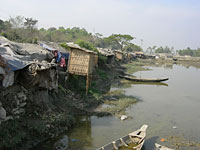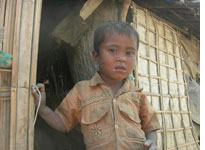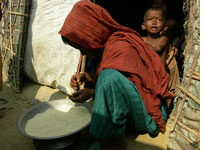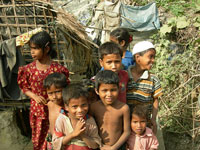Dispatches From Bangladesh
Nurul Haq hasn't been sleeping at home. In the middle of the night, he slips away from his wife, tiptoes out of the house, and lays on the muddy bank of the Naf River. Every night of the last week, Bangladeshi police and army personnel have stormed his refugee camp in search of criminals—or any able-bodied male with the capacity to act as one—as part of a nationwide anti-crime and anti-corruption campaign. Nurul, a gaunt man in his early 20s who wears a trimmed mustache and a floppy hairstyle, claims that dozens have already disappeared. To avoid arrest, most of the men hide in the jungle. When I asked Nurul why he opts for the riverbank, which seemed to provide less cover, he answered frankly: "I am terrified of the elephants." (Wild elephants roaming the dense hills along the Bangladeshi-Burmese border impale, maul, or stomp to death at least 20 locals every year.)
Nurul is a Rohingya, an outcast community of Muslims from Rakhine state in western Burma (officially known as Myanmar). Burma's military government considers Rohingyas to be migrants from Bangladesh, since they moved to Burma only in the last few centuries, and it refuses to grant them citizenship rights. "They are treated like dogs," an official from the U.N. High Commissioner for Refugees told me. Under "nationality and religion," their national ID cards read "Bengali Muslims." The junta disparages Rohingyan religious and cultural traditions at every opportunity. Most mosques stand in disrepair. Those in passing condition are turned into police and fire stations. Rohingyas who wish to marry must obtain official permission and pay a whopping tax. If the Burmese authorities find out that a couple has evaded payment, the groom is sent off to a labor camp for several years until he works off his "debt."
In 1992, 250,000 Rohingya refugees crossed into Bangladesh after rumors circulated that the Burmese army was torching Rohingya villages. UNHCR immediately established 22 camps from Cox's Bazar, a resort city that boasts the longest natural beach—at 75 miles—in the world, to Teknaf, the southernmost city on the Bangladeshi mainland and a renowned hub of smuggling activity. Since then, most of the refugees have returned to Burma, and only two official UNHCR camps remain, housing 26,000 people. But there is also an unofficial camp just north of Teknaf that is home to some 10,000 refugees—commonly referred to as the "makeshift camp." Opportunities for work are scant; Nurul pulls a rickshaw a few days a week and fills the rest of his time as a fisherman. Neither pays more than a dollar a day. Burma's government asserts that rebel fighters belonging to the Rohingya Solidarity Organization operate and recruit there. Others allege that international jihadist outfits poach from the ranks of desperate refugees.
I rented a microbus and went to Teknaf to see the makeshift camp. The road from Cox's Bazar to Teknaf crosses through one of the most conservative areas in Bangladesh. Madrassas, or Islamic seminaries, appeared every few miles on either side of the road. The few women on the streets wore black burqas that cloaked their faces. From a distance, it was difficult to tell which direction they were heading. Lush hills, like giant green gumdrops, formed the landscape to the west. The unimaginably wide Naf River, the natural barrier between Burma and Bangladesh, formed the other. I was marveling at the natural beauty when we arrived at the camp.
At first glance, the makeshift camp looked like a burlap city, hut after hut made of floppy brown material. But it wasn't burlap or canvas, it was tarps and patches of plastic garbage bags caked with dust. Along the roadside, sections of homemade bamboo lattice pretended to act as a fence. Yet the refugees spilled across the street. Naked children with dripping noses and medicine-ball bellies chased one another back and forth through traffic. Nurul sent someone from the hut he shared with his teenage wife and another couple to bring tea, while his 2-year-old son stood by his side. The boy was naked and snot dripped onto his lower lip. (Doctors Without Borders, which runs a clinic across the street, estimates that 30 percent to 40 percent of the kids have respiratory infections.) He played with his penis the entire time.
The Rohingya camps are filled with disease. More debatable is whether criminals infest the camps. In one of the UNHCR camps, a Bangladeshi security officer explained that almost every male was involved in muggings and thievery, if not worse crimes. I couldn't gauge the veracity of such claims. On the one hand, no one would know better than the man in charge of security for the camp; on the other, Bangladeshi officials exaggerate the Rohingyas criminal activities in order to expedite their repatriation to Burma. The government accuses them of being terrorists. The Dhaka-based Daily Star reported in August 2006 that, "Jama'atul Mujahideen Bangladesh"—the group responsible for detonating 500 bombs simultaneously throughout Bangladesh in August 2005—"emerged with its militant activities by sending trained Muslim Rohingya rebels to Afghanistan and Kashmir war fronts in the 1980s." When I asked Nurul whether he had witnessed recruitment in the camp, he first denied hearing about any such things. Then he spoke up: "Last year, 15 people suddenly disappeared and went off to get military training in the hills. When they came back, we asked them where they had gone. They said, 'We went for the greater benefit of the Rohingya people.' " Nurul said he didn't know the name of the group that offered the training, but he assumed it was RSO. The fresh recruits told Nurul that they were "preparing to fight for the liberation of Myanmar."
Until then, the Rohingyas will keep squatting in their squalid camps, grateful for every day they aren't arrested, evicted, or forcibly repatriated. The UNHCR camps aren't accepting new refugees, and the Rohingyas believe that the Bangladeshi government is looking for any excuse to deport them. For a long time, they've had no place to call home. Now, with a state of emergency declared in Bangladesh and the army being given more leeway to chase criminals and "cleanse society of unwanted elements," the Rohingyas fear a more aggressive campaign against them may be in the offing.
If people like Nurul returned to Burma, the military would kill them before long. The Burmese army keeps track of the Rohingyas in Rakhine state by conducting unannounced head counts. Those who are absent are considered rebels. According to Nurul, one of the army's preferred methods for punishing traitors is to bind them to a pole under a low tin roof in the sun and then leave them to bake to death. Nurul came to Bangladesh for the first time nearly 10 years ago, holding in his hand a 20-day work token for which he had paid a Bangladeshi border guard a few hundred taka—or around $5. (The Burmese border guards make no effort to keep the Rohingyas from leaving.) When Nurul returned to the border area after his token expired, a fellow Rohingya warned him that roll call had been done. He was listed as missing. He immediately turned around and has been in Bangladesh ever since.
I put a question to Nurul and the other people who had joined us in the hut: Could you ever return to Burma under the current government?
An old man who had recently arrived in Bangladesh spoke up. He said he was cheering for leaders like Aung San Suu Kyi, the Nobel laureate whom the military junta has kept under house arrest since 1989, and desperately wanted to see democracy in his home country. Only then could he consider returning. But being a Rohingya has made him skeptical of all governments. "It doesn't matter who is in power," he said, "If I see cops in the road, I have to run and hide in the forest."
Late in the afternoon, I said goodbye to Nurul. His son gave me a high-five with his penis-twiddling hand. Just outside the hut, another toddler sent an arching stream of urine into a pool of stagnant water, on the other side of which a woman was washing her hair. Teenage girls carried bundles of sticks on their heads, and the glow of the setting sun filled the alleys of the camp. In a few hours, it would be dark, and the army would come looking for criminals. With luck, Nurul would once again tiptoe out of his house to go sleep in the muck along the side of the Naf River.



